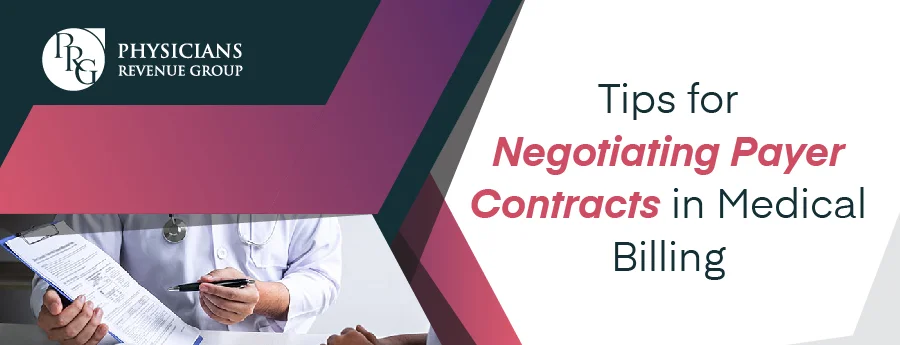
Email: info@prgmd.com | Call: +1 (630) 242-6474
Business hours: 9:00 to 5:00 | Monday to Friday
Email: info@prgmd.com | Call: +1 (630) 242-6474
Business hours: 9:00 to 5:00 | Monday to Friday

Table of Contents
ToggleLooking for tips to ace payer contract negotiation? You are at the right place.
But first, let’s talk about why you must negotiate with payers.
Most of the time, medical practices leave the negotiation part of the contracts to office managers or medical directors. This doesn’t have to happen every time – hear us out. Even physicians with a hands-on approach to business and past working experience with multiple payers might not realize the bargaining power they wield. When it comes to medical billing services and operations, remember that insurance providers are responsible to other stakeholders in the following order:
If you want to negotiate better rates, fewer denials, and improve overall reimbursements, read on the strategies below to formulate a favorable payer contract negotiation:
No one can negotiate if they are unaware of the baseline. Use the contracts and fee schedules to your advantage, and forecast a 3-5% increase. Do you know how much revenue that can bring to your practice?
Besides, another reason to review current contracts is to help identify and address payment variances that fall below your contractually agree-on rates. Ensure your practice is aware of the fruits of prior negotiations.
Is your practice a part of an ACO or a CIN (clinically integrated network)? If not, then consider joining one. You can still function as a standalone practice, but it is only about taking advantage of present opportunities. If you partner with a larger entity, then you can demonstrate quality.
The payment models are bound to change, and it is equally important for healthcare practices to prepare for moving and shifting in the more suitable direction to keep your practice alive.
Even if your practice is not a part of an Accountable Care Organization (ACO) or any other type of value-based contract that necessitates you to capture some quality and cost metrics – your practice must still be participating in Medicare’s Merit base incentive payment system, which requires this type of data.
What does the Medicare data say regarding the care your practice offers, and how can you use that data for your advantage while in payer contract negotiation with commercial payers? Make a defined plan and use this data to fuel your contract negotiation – as networking with high-quality, independent practices like yours is good for payers.
While negotiating for a payment rate increase, it is essential to showcase your value proposition to the payer compared to your local peers.
You get the gist.
Sometimes, medical practices have market dominance within a set-mile radius and do not even realize it. If this is you, leverage your value to negotiate a higher cut.
This is the total number of patients you have seen/treated over the last two years. How can you use this number?
Remind the payer that if you leave their network, they (the payer) will have to notify all patients that their designated care physician is no longer associated with the network. This instance could make patients unhappy about needing to switch physicians. It is a massive administrative headache for payers and patients.
Find out how one payer’s payment rates percentages compare with others – is your payer paying below the market rates? If yes, use this information, either average rate or rate by rate, to build a case for securing higher payment rates.
Next, get in touch with other physicians in your area and get an idea of their contract rates. You can also use blinded data as a published benchmark for negotiating payment and denial rates.
Most physicians offer COVID-19 laboratory tests and immunizations, and then codes for these may be off their fee schedule with a pre-negotiated rate. Moreover, in such instances, the physicians are paid a percentage of the charges, which is mostly lower.
All you have to do is add these tests and immunizations to your fee schedule, and you will get more money for performing the same services.
These include:
Share:
Categories
Recently Added

What is a TPE Audit in Healthcare

What is an ABN in medical billing?

What does a Clearinghouse do During Claims Submission?
We Would Love to Assist You!
We treat your data confidentially and don’t share any information with a third party.